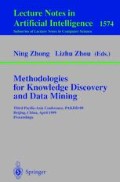Abstract
Knowledge discovery from raw data is very important to non-experts and even experts who feel difficulty in expressing their skills in machine interpretable forms. However, real world data often contain some redundant or unnecessary features, and if they are directly used, the quality of the seeking knowledge may be much degraded. Here, a new technique of dynamically selecting features is suggested. Contrary to the static feature selection, this scheme selects each new feature based on its correlation with the previously selected features. In addition, this scheme does not require setting any threshold, which would be too difficult to decide. Experiments have been conducted for some real world domains in terms of tree sizes and test data error rates. The results show the soundness of this scheme.
This work was supported by Korea Science Foundation under contract 97-01-02-04-01-3.
Access this chapter
Tax calculation will be finalised at checkout
Purchases are for personal use only
Preview
Unable to display preview. Download preview PDF.
References
J.R. Quinlan, “Learning efficient classification procesudres,” Machine Learning: An AI Approach(edited by R.S. Michalski and et al.), Tioga Press, 1983.
J.R. Quinlan, C4.5: Programs for Machine Learning, Morgan Kaufmann 1993.
D.E. Rumelhart, G.E. Hinton, and R.J. Williams, “Learning internal representation by error propagation,” In Parallel Processing: Explorations in the Microstructures of Cognition, 1, MIT Press, MA, 1986.
R.S. Michalski, “Pattern recognition as rule-guided inductive inference, ” IEEE Trans. Pattern Analysis and Machine Intelligence, PAMI-2(4), pp.349–361, 1980.
S.J. Hong, “R-MINI: An Iterative Approach for Generating Minimal Rules from Examples, ” IEEE Trans. Knowledge and Engineering, 9(5), pp.709–717, 1997.
K.C. Lee and J.B. Kim, “A Rule Generation Technique Utilizing a Parallel Expansion Method,” Korea Information Proc. Society, 5(4), pp.942–950, 1998.
C.E. Shannon and W. Weaver, “A Mathematical Theory of Communication,” Urbana, IL: University of Illinois Press, 1949.
R. Battiti “Using Mutual Information for Selecting Features in Supervised Neural Net Learning,” IEEE Trans. on Neural Networks, 5(4), pp537–550, July 1994.
UCI ML Repository Content Summary, http://www.ics.uci.edu/~mlearn/MLSummary.html
Author information
Authors and Affiliations
Editor information
Editors and Affiliations
Rights and permissions
Copyright information
© 1999 Springer-Verlag Berlin Heidelberg
About this paper
Cite this paper
Lee, KC. (1999). A Technique of Dynamic Feature Selection Using the Feature Group Mutual Information. In: Zhong, N., Zhou, L. (eds) Methodologies for Knowledge Discovery and Data Mining. PAKDD 1999. Lecture Notes in Computer Science(), vol 1574. Springer, Berlin, Heidelberg. https://doi.org/10.1007/3-540-48912-6_19
Download citation
DOI: https://doi.org/10.1007/3-540-48912-6_19
Published:
Publisher Name: Springer, Berlin, Heidelberg
Print ISBN: 978-3-540-65866-5
Online ISBN: 978-3-540-48912-2
eBook Packages: Springer Book Archive

